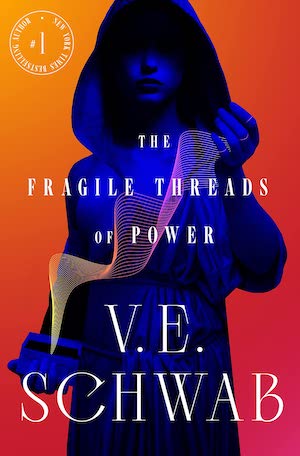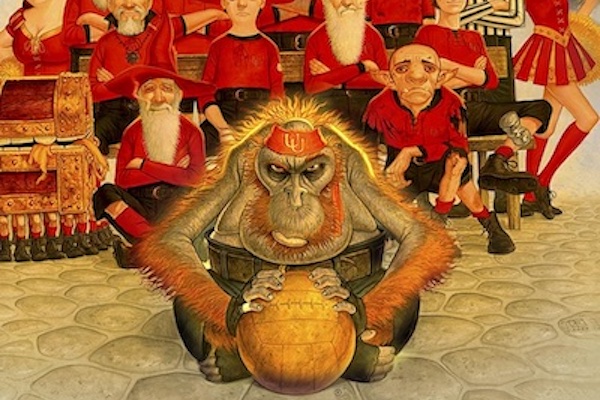Look, Otto tried to help, but there’s only so much you can do in the middle of the forest… unless Sam Vimes is helpfully spying on you.
Summary
William de Worde leaves after giving a few more tips and preparing to write about them in the paper. Polly sees the troop huddle around one of the copies, featuring the picture of them all. Maladict is staying under a blanket and suggests they blend in with the forest, which Blouse agrees with, having read it was successful in old military campaigns. The group covers themselves in foliage. Blouse reveals his plan—he wants to infiltrate Kneck Keep and take it back from the enemy. Jackrum insists it can’t be done with the men they’ve got, but several of them are willing to try, so they press on. Maladict insists they’re being followed, and they give him acorn coffee to try and tide him over, but it’s not helping much. Igorina is prepared to stake him, if the effects become too pronounced. Polly notes that Tonker and Lofty might be more than friends. Wazzer thinks women should run the world. Jackrum sees a wolf watching them, and Polly wonders if it’s not a werewolf since they were rumored to have one in their squad. Blouse catches Jackrum out in a lie when he claims that plundering is in the military manual, but he says nothing. The other side is signaling at night, looking for their spies, so Blouse gets the squad to signal back with a false message, putting the enemy off their trail entirely.
Buy the Book


The Fragile Threads of Power
Buggy relays information from Angua to Vimes, recommending that the squad be sent coffee stat. Vibes think it’ll make them suspicious, but goes for it anyway. The troop makes it close enough to see the Keep, which is huge, but Blouse is determined to find a way in. Polly, Wazzer, and Maladict find the washerwomen’s entrance; on the way back they’re nearly caught by the enemy. Polly draws her sword to kill one of them before they’re spotted, but the turkey flies out at precisely the right moment and the men move on—this makes Polly wonder about Wazzer’s insistence that the Duchess is guiding her. The group knows that they’ll never get Blouse to go for the idea of letting them sneak in disguised as washerwomen, so Polly plants the idea when she’s bringing him and Jackrum tea. Blouse stumbles into the thought as planned, but Jackrum doesn’t want any of it; he knows about the squad too, somehow. This turns out fine because Blouse believes he’s the only one who could convincingly play a woman, having done so in theater as boarding school. He asks Polly to shave him again, but once again, Jackrum saves her, this time by telling Blouse that she’s underage to prevent her from being assigned to the mission.
Blouse also notes the Jackrum has a very puzzling record that seems to indicate that he enlisted at age five, a file that has been amended many times over by his ranking officers. After they let Blouse go, Polly mentions that Maladict seems to be doing alright without the coffee, triggering an episode—but he’s promptly knocked out by a sack of coffee beans falling from the sky. They wait for Blouse, but he doesn’t return, prompting Polly to insist that she’s going to the Keep whether Jackrum wants them to or not. She tells him that he clearly knows she’s a woman, which Jackrum confirms: He knows about most of them, but is unsure of Maladict and Jade, and was the one who gave Polly the socks for her trousers. Jade agrees to stay and look after Maladict, but the rest are determined to go to the Keep, and Jackrum notes that they gave most of their clothes and kit to Blouse. He takes them to the Borogravian side of the battlefield where a small city has sprung up and takes them into a “house of good repute,” heading off with the madame and telling the “lads” to come quick when they hear the whistle. The group go off with the girls, hear the whistle, and make off with their clothes in a hurry.
They get dressed up, and Jackrum promises to rouse a group of soldiers for a diversion while they sneak in to the keep. The group finally asks him why the group is called the Ins-and-Outs and also “cheesemongers.” Turns out, it relates to a folk song about a soldier who steals a young woman’s cheese when her garter falls down. Polly is put in charge of the mission and they head off. They don’t have papers when they get to the gate and are immediately turned over to the captain, who knows their secret—they’re men. Shufti lifts her skirts to make it clear that’s not the case while Tonker bursts into tears. Blouse comes in, still in disguise as “Daphne,” to take them to work. He tells them everything he’s found out, and that he has a date with a guard he plans to kill this evening. Blouse takes the “lads” to the woman running the laundry, Enid, who immediately clocks that they’re all actually women. Wazzer tells them that Nuggan is dead now, and the new Abominations are created by worshipper fear. Polly listens to the washerwoman gossip and finds Blouse giving everyone instructions on better ironing. (All the girls know he’s a man, but he’s so good at ironing and they want to know the outcome to the date.) But Polly feeds yet another plan to him that might allow them to take the Keep, and insists that they move immediately.
Commentary
Gender! It’s entirely dependent upon expectation and performance! That’s what this entire section is about!
Blouse believes that his troop are far too male to be able to pass as girls, but he can do it because he’s played lady roles in theater during his schooling days. His performance does convince the men at the keep, but doesn’t convince any of the women he’s working with… because it’s too much performance.
Let me explain: We’ve constructed gender roles in such a manner that they are expected to be “over-performed” in front of the opposite gender. This is particularly true for women, who are constantly walking a proverbial tightrope in that regard, and often taught that the only way to make men like (or even just tolerate!) them is to behave in a manner that is ultra-feminine. Be sweet, be demure, be solicitous, be empathetic, be emotional, etc. Plenty of women forego this entirely, but more to the point—women don’t generally do this around each other.
Much of the history of the arts, theater included, played into this exact problem: plays written by men, who were giving their perspective on how women behaved, in roles that were then also played by men bringing their own biases about women’s behavior, and also catering it to the expectations of the men around them. Blouse can easily fool other men into thinking he’s a woman, but he has no hope in the world of fooling other women. The performance is off.
The In-and-Outs are having a different problem: Having spent so much time pretending to have the freedom that men have, they’ve grown accustomed to it. In addition to that, they haven’t been pretending to each other for quite some time, and even stopped pretending to Jackrum. They’ve been doing their own performances, but to a far lesser degree of late. Then they try to perform again at the brothel, then stop performing that and go back to the different performance of being demure ladies, and the whole thing gets so jumbled that the men at the Keep can see something’s squiffy. They’re overcompensating, and they’re not wearing their own clothes while doing it, making the whole thing that much harder to pull off.
But thankfully, most folks think gender is just your genitalia, so that problem gets sorted very quickly.
We get far more of Jackrum and Wazzer in this segment, building in both cases to… well, that comes later. But their perspectives start shaping the plot in very specific ways, starting with Jackrum’s distrust of education in general, and writing and reading specifically, when he says of William de Worde, “You can’t trust people who do that stuff. They mess around with the world, and it turns out everything you know is wrong.”
Which is true pretty much all the time in every way regardless, but most people hate being reminded of it, and will do anything in their power to prevent it. (Which is certainly part of the reason books get banned, for example.)
And then there’s Wazzer, who tells Polly that the world would be better if it were run by women. Polly thinks that the only reason Wazzer thinks so is because she doesn’t know enough of them, which makes a good point. (Suggestions that all the world’s problems could be solved by putting ‘X’ group in charge are never as wise as the folks spouting them want to think.) But there are plenty of women who do believe this, even having known their own fair share of cruel and controlling women, as Polly has. And the delineation lines on whether or not they still think so often comes down to—in my own personal experience at least—what they have experienced at the hands of men. Meaning, it’s less about thinking women are better than it is about being afraid of what men do… and I can’t help but wonder if that isn’t true for Wazzer here.
Wazzer does, on the other hand, have a very specific wisdom to her (being modeled off Joan of Arc), particularly when she says things like this: “You fear tomorrow, and you’ve made your fear your god.” Because yeesh, if there aren’t so many religions (or certainly specific groups within them) running on precisely that. But it’s important here, too, that Wazzer is based on a figure who is nearly always framed as “main character” and has been relegated to a side player—because Pratchett never gives those roles to “heroes.” Heroes are useful for plot, but they’re not perspective-taking characters to him.
Asides and little thoughts:
- The comments about birdsong being peaceful unless you know enough about birds is… so true.
- ’Tis Pity She’s a Tree??? I am deceased. (Also really wanna know what that show’s about.)
- Pointed that Maladict is the one who notes that he’s thinking of a different sort of procedure when Igorina says she’ll take up needle and thread and “make a woman of” Blouse. But we’ll get into that next week, I expect.
- Having a foodstuff or clothing item named after you as a “military hall of fame” deal is a reference to things like Napoleon mille feuille, or Wellington rain boots, of course.
- “It was women’s work, and therefore monotonous, backbreaking, and social.” <—…Dang that. That’s it. That’s the thing. He just needed to add “invisible” and “grossly underpaid (provided it’s paid at all).”
Pratchettisms:
“Men,” said Blouse, as if he’d only just reached that conclusion.
The presence of those seeking the truth is infinitely to be preferred to the presence of those who think they’ve found it.
“Oh, you think you can kill a werewolf with an IOU?”
He turned around, tapping the side of his nose with an expression of idiot knowingness.
They were an Abomination Unto Nuggan, but men have always found space in their religion for a little sinning here and there.
The word to describe the four ladies seated in the room beyond, if you wanted to be kind, was “tired.” If you didn’t want to the kind, a whole range of words were just hanging in the air.
Just to look at her was to mentally order a large pretzel.
Polly’s native tongue had no word for “freaky,” but if she had known about the word she would have welcomed its inclusion.
Next week we finish the book!











